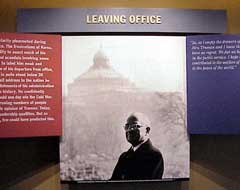Harry Truman's popularity plummeted during his final years in office. The frustrations of Korea, the President's inability to enact much of his domestic program and scandals involving some of his staff led many to label him weak and ineffective. On the eve of his departure from office he stood below 30% in popularity polls. In his farewell address to the nation he reviewed the accomplishments of his Administration and made his case to history. He confidently predicted America would one day win the Cold War.
Near a large photomural of President Truman looking relaxed at the inauguration of Dwight Eisenhower, a 1952 vintage television set runs a video program consisting of excerpts from Truman's televised farewell address to the American people on January 15, 1953. An "In His Own Words: Leaving Office" flipbook features entries that reflect on his two terms in office.
Truman: In His Own Words
- Speech draft, February 5, 1952, in which Truman declines to run for reelection. Papers of Harry S. Truman: President's Secretary's File.
- Diary entry of Harry S. Truman, September 9, 1952, describing his day and ruminating on the approaching end of his term in office. Papers of Harry S. Truman: President's Secretary's File.
- Telegram, Harry S. Truman to Dwight Eisenhower, November 5, 1952, congratulating him on his victory in the presidential election. Papers of Harry S. Truman: President's Secretary's File.
- Letter, Harry S. Truman to Nellie Noland, November 25, 1952, regarding getting ready to leave office, his thoughts on Eisenhower, and coming home to Independence. Papers of Mary Ethel Noland.
- Diary entries of Harry S. Truman, January 20-21, 1953, describing the Inauguration Day ceremonies and his return to Independence. Papers of Harry S. Truman: President's Secretary's File.
